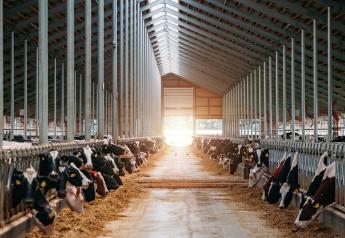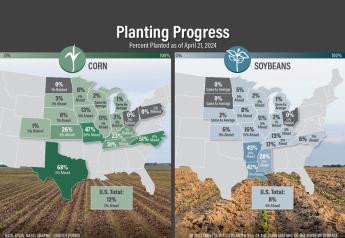3 Pennsylvania Farms to Harness Power of Manure

California's carbon credit program may wind its way to Pennsylvania's dairy farms.
Three local farms have installed manure digesters that will produce electricity by burning methane gas.
Corporations wishing to reduce their carbon footprints will buy the carbon credits made available by the farms' reduced release of methane, a powerful greenhouse gas.
"It doesn't make a lot of sense to this farmer, but they say it's critical to make a project go," said St. Thomas dairyman Ben Peckman. "If it can make something beneficial, we'll keep making manure."
Cheap animal bedding, not the market for carbon credits, sold Peckman on the idea.
"The opportunity to use the bedding, that's the biggest thing," he said. "Of equal value is the claim that most of the odor is removed from the manure. Any time you haul manure it stinks. You can't put a dollar value on that."
Peckman on Tuesday sat at the back of the room at the Four Points by Sheraton in Chambersburg where about 40 agriculture educators, conservation officers and government agents heard about the project.
They are the best people to give farmers straight answers about the potential for methane digestion of small farms, according to Derek Six, CFO of Environmental Credit Corp., State College.
"We're not here to sell anything," said Scott Subler, Environmental Credit president and CEO. "We're here to learn the waivers and constraints of why can't carbon credits out there be going to small farms."
"We want to create a solution for the underserved small farm market," said Sean Breen, senior business developer for Native Energy of Vermont.
Native Energy and Environmental Credit Corp. have teamed up on the 10-year demonstration project. Typically only operations on large farms, huge by Pennsylvania standards, are worth the trouble of verifying for the carbon credit market.
The cost of flying in an engineer to verify a carbon-cutting operation can wipe out the carbon credits from a small project, Subler said. That's why the local project has three farms.
The farms in the $1.3 million project are:
- Jack Martin's JEM farm near Zullinger with its 230 cows.
- Ben Peckman's Slate Ridge Farm in St. Thomas with 140 cows and 750 heifers.
- Sherwin and Becky Brechbill's 270-cow dairy at Duffield.
"We anticipate all three projects will be in operation by the end of the summer," Breen said.
Each $450,000 farm system processes manure in an anaerobic digester. Methane is burned in a natural gas engine to produce electricity which is sold to West Penn Power. Liquid is squeezed from the solids. The liquid from 2,000 cows can irrigate 150 acres. The drier solids can be hauled to fields far away.
But in the case of the three local farms, the solids will be composted and turned into bedding. Bedding typically costs $12 to $18 a cubic yard.
A farmer who had been paying $1,200 a month for bedding currently pays just $200 a month for his digestion system and uses the bedding made from the composted nutrients, according to Zach Pagel of Integrity Ag Systems of Chambersburg.
"The real key for profitability is not what happens on the front end," Pagel said. "It's on the back end."
Integrity Ag, "a boutique manure management firm," has developed specialized technology since 2001 to help farmers handle manure and nutrients, according to Pagel.
The three local farms will serve a nucleus for other projects in Pennsylvania, according to Breen. A grant to the Pennsylvania Department of Environmental Protection from the American Recovery and Reinvestment Act helped finance the demonstration project.
Future efforts cannot count on significant subsidies, Subler said.
"Politics have gotten terrible," he said. "We had a couple of grants, and they're gone."
"Farms smaller than 1,000 cows in Pennsylvania will need some level of subsidy to be feasible for manure-only digesters," Breen said. "The economies change with the co-digestion of food waste. Expansion with small farm digesters in Pennsylvania will most likely be done by co-digestion."
"Almost everything in Europe is co-digestion," Pagel said.
Integrity Ag will act as a "food substrate broker" connecting food processors to farms with digesters, Pagel said.
Even at the small scale of the project, it's likely to apply only to the largest farms in the county. The average herd in Franklin County, Pennsylvania's No. 2 dairy county, has 100 cows.
"This to us is a demonstration project," Subler said. "A lot depends on the price of carbon credits. It's a real market in the U.S. It's driven by California."
While a national mandatory carbon credit market has been struck down, at least temporarily, California's market is going strong. Corporations doing business in California, from utilities to oil companies to retailers, are looking to offset their greenhouse gas production by buying carbon credits anywhere in the nation.
NativeEnergy specializes in the voluntary carbon credit market, which has been driven in part by the threat of a national mandatory carbon credit market and corporations wanting to appear as green as possible.
The voluntary national carbon credit market has not gotten better in recent months, but cutting greenhouse gases remains a popular concept, according to Subler.
"Improve deficiency is a good business practice," Subler said. "I think that's what's snowballing on the corporate side from Wal-mart to Waste Management."
Peckman meanwhile wonders about maintenance on his digester.
"It's going to be a learning process," Peckman said. "We don't have time to give it five or six hours a day. If it requires that, it's not going to work. We're hopeful it doesn't require that. We'll definitely know more in a year."
------------
Jim Hook can be reached at 262-4759 and jhook@publicopinionnews.com .







